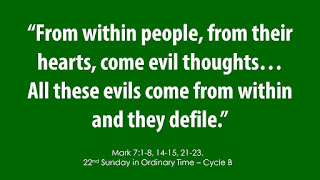Holy Gospel of Jesus Christ according to Saint Mark 7:1-8, 14-15, 21-23.
When the Pharisees with some scribes who had come from Jerusalem
gathered around Jesus,
they observed that some of his disciples ate their meals
with unclean, that is, unwashed, hands.
—For the Pharisees and, in fact, all Jews,
do not eat without carefully washing their hands,
keeping the tradition of the elders.
And on coming from the marketplace
they do not eat without purifying themselves.
And there are many other things that they have traditionally observed,
the purification of cups and jugs and kettles and beds. —
So the Pharisees and scribes questioned him,
"Why do your disciples not follow the tradition of the elders
but instead eat a meal with unclean hands?"
He responded,
"Well did Isaiah prophesy about you hypocrites, as it is written:
This people honors me with their lips,
but their hearts are far from me;
in vain do they worship me,
teaching as doctrines human precepts.
You disregard God's commandment but cling to human tradition."
He summoned the crowd again and said to them,
"Hear me, all of you, and understand.
Nothing that enters one from outside can defile that person;
but the things that come out from within are what defile.
"From within people, from their hearts,
come evil thoughts, unchastity, theft, murder,
adultery, greed, malice, deceit,
licentiousness, envy, blasphemy, arrogance, folly.
All these evils come from within and they defile."
gathered around Jesus,
they observed that some of his disciples ate their meals
with unclean, that is, unwashed, hands.
—For the Pharisees and, in fact, all Jews,
do not eat without carefully washing their hands,
keeping the tradition of the elders.
And on coming from the marketplace
they do not eat without purifying themselves.
And there are many other things that they have traditionally observed,
the purification of cups and jugs and kettles and beds. —
So the Pharisees and scribes questioned him,
"Why do your disciples not follow the tradition of the elders
but instead eat a meal with unclean hands?"
He responded,
"Well did Isaiah prophesy about you hypocrites, as it is written:
This people honors me with their lips,
but their hearts are far from me;
in vain do they worship me,
teaching as doctrines human precepts.
You disregard God's commandment but cling to human tradition."
He summoned the crowd again and said to them,
"Hear me, all of you, and understand.
Nothing that enters one from outside can defile that person;
but the things that come out from within are what defile.
"From within people, from their hearts,
come evil thoughts, unchastity, theft, murder,
adultery, greed, malice, deceit,
licentiousness, envy, blasphemy, arrogance, folly.
All these evils come from within and they defile."
---
This Sunday’s Gospel presents to us a controversy between the Pharisees and Jesus’ disciples. Apparently, Jesus’ disciples have not been following the ritual traditions of purification in the Jewish religion. The Pharisees, who are strict observers of the law, point this out to Jesus in the belief that what these rituals are the true expressions of worshipping God. Not doing them means forsaking God.
Jesus turns around the debate by pointing out to the Pharisees that it is not what we do that makes us pleasing to God but rather the sincerity of our hearts that flows to our actions. For Jesus, it is important that a person worships God through his actions because those actions are motivated by love that comes from the person’s heart. A loving and merciful heart that expresses itself in acts of charity is true worship of God.
In Filipino pop culture, “hugot” means drawing out from one’s deepest emotions. Like Jesus, we Christians draw out our actions from our deep love for God and for our neighbor. Rituals themselves are not bad but they become meaningful when they are motivated by love and meant for love. For Jesus, we worship not in empty rituals but in love expressed and made felt.
Jesus turns around the debate by pointing out to the Pharisees that it is not what we do that makes us pleasing to God but rather the sincerity of our hearts that flows to our actions. For Jesus, it is important that a person worships God through his actions because those actions are motivated by love that comes from the person’s heart. A loving and merciful heart that expresses itself in acts of charity is true worship of God.
In Filipino pop culture, “hugot” means drawing out from one’s deepest emotions. Like Jesus, we Christians draw out our actions from our deep love for God and for our neighbor. Rituals themselves are not bad but they become meaningful when they are motivated by love and meant for love. For Jesus, we worship not in empty rituals but in love expressed and made felt.


